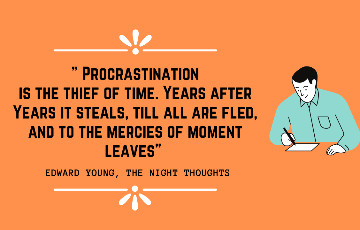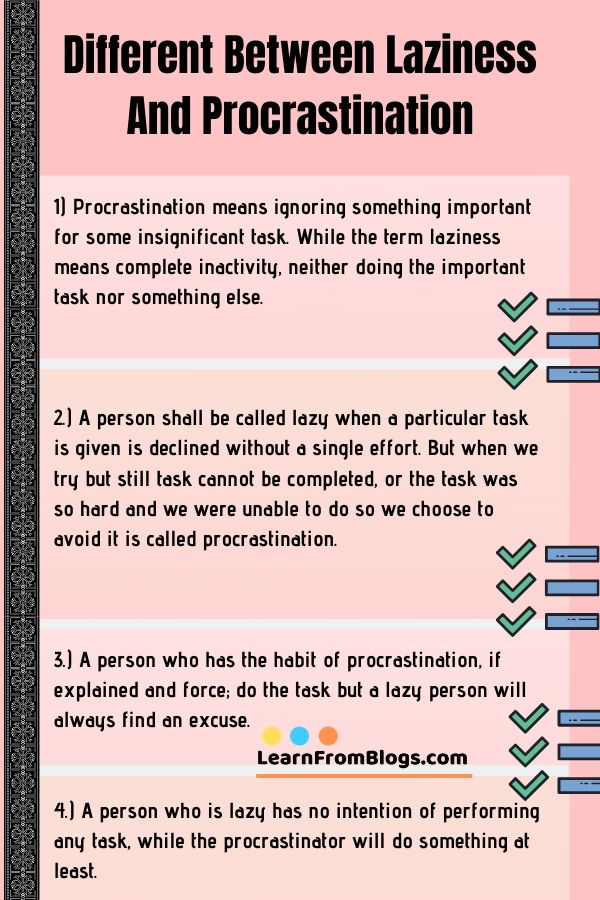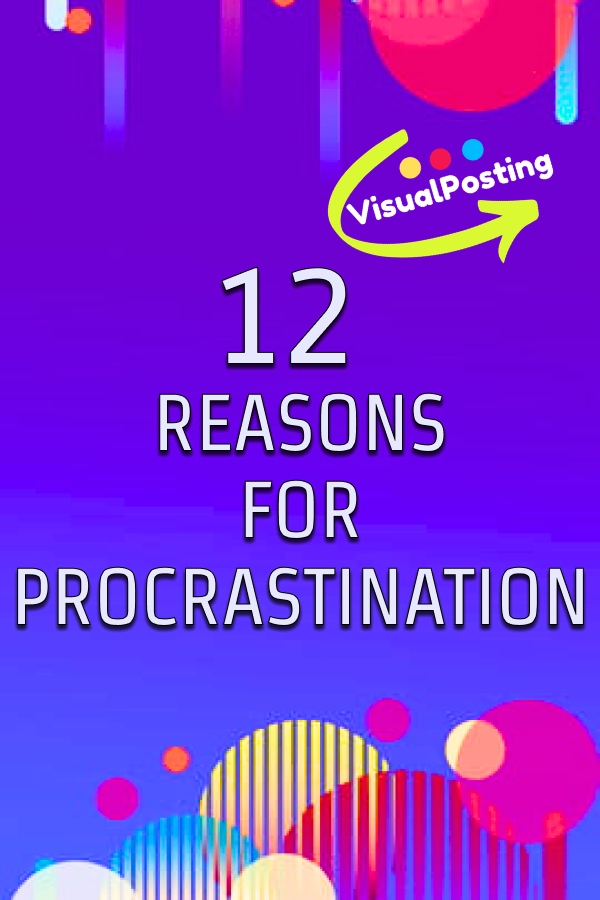
Learn about procrastination and its detrimental effects on time and productivity. Discover strategies to overcome procrastination and enhance efficiency.
We all know how Procrastination overshadows all the good habits we have. But here’s a poet, taken a step above and explained how procrastination is robbing your time. Edward Young, an English poet, has written about procrastination in his poem “The Night Thoughts”. He describes how procrastination steals your time and slowly takes away everything productive from you.
The lines in his poems say:
“Procrastination is the Thief of Time. Year after year it steals, till all are fled, and to the mercies of a moment leaves.” – Edward Young, Night Thoughts.
Procrastination is the Thief of Time: Explained
The Poet has rightly pointed out that procrastination steals away your valuable time. Slowly, procrastination can become a habit. And year after year if we look back, procrastination would have taken all productive things away from us. Except for the mercies of the present moment, all progressive things would have been lost by then.
With Procrastination:
What’s Lost is Lost!
We all have heard a line that says “what’s lost is lost”. It is true with procrastination. The time, efforts, progress, good-habits, good-routines, and all good things in our life can go in vain if we keep procrastinating. We cannot get back the time lost. Edward young rightly pointed out that “year after year, it steals”.
It steals your Years!
Imagine that if you keep procrastinating your tasks every day. By the end of the month, you will have a heap of unfinished tasks. Imagine if you keep doing this habit for three months or six months? What happens? You have lost a valuable period of the year.
Conclusion:
Edward young is clear that procrastination is the thief of time, as it takes away all the good things we have year after year till we are left with nothing but the present!

What does procrastination mean?
Procrastination is defined as the act of postponing or delaying something due to various factors. Additionally, it can also be termed as avoidance to get a task done which needs to be met at deadlines. The reasons for the same could be an intentional delay or habitual delays.
Procrastination could have negative consequences and effects. However, when you delay a task for a good reason, that isn't called procrastination. In other words, when you delay any task without any reason, that is when it is said to be procrastination. For example, if a person is responsible for collecting the reports, which includes new reports as well. The individual may claim to give it more time in order to study and achieve an accurate report. However, most of the tasks do not get better with delays.
What are the benefits of stopping procrastination?
Overcoming procrastination is quite an inner struggle that needs to be dealt with. Stopping procrastination can help us in multiple ways. Here are some of the benefits of how you can stop procrastination.
1. Self Discipline
Studies show that procrastination is not a time management issue. One of the main causes of procrastination is lack of self-discipline. A great way to build up your self-discipline is to work on beating procrastination. Procrastination is the thief of time.
2. Greater Work Performance
It is known that individuals who don't procrastinate have better work performance. When you work with dedication, discipline, and responsibility, you are known to have a better work performance.
3. Lower Stress
When you stop procrastination, it leads to lower stress and anxiety. Additionally, when you finish work on time, you can be relaxed and stress-free. Completing a work can be difficult, but delaying it could have more complex consequences.

So many of us get confused about these two words, thinking that they both mean the same thing. It is not here are the difference between the two:
1. Procrastination means ignoring something important for some insignificant task. While the term laziness means complete inactivity, neither doing the important task nor something else.
2. A person shall be called lazy when a particular task is given is declined without a single effort. But when we try but still task cannot be completed, or the task was so hard and we were unable to do so we choose to avoid it is called procrastination.
3. A person who has the habit of procrastination, if explained and force; do the task but a lazy person will always find an excuse.
4. A person who is lazy has no intention of performing any task, while the procrastinator will do something at least.
No matter what the ever is it laziness or the habit of procrastinating they both are bad for our career and future. So stop it before it’s too late and be wise to try my ways to remove these habits.

Here are the reasons which lead to the procrastination:
1. Fear of unknown.
2. I’ll do later.
3. Completing only easy tasks because they are easy.
4. Unclear about how to get started.
5. You get distracted.
6. Perfectionism.
7. Depression.
8. Lack of motivation.
9. Thinking of people.
10. Fear to be called stupid.
11. Nervousness.
12. The habit of longing it.
These are the main 12 reasons which lead to procrastination. These are the things which you must avoid. If these are the habits which you have, then try to overcome them by simple techniques. These seem to be very small but leads to massive destruction of your career or personal life. Try to overcome them soon.
"The road to success and the road to failure are almost exactly the same." -- Colin R. Davis

Yes, the habit of postponing our work for some other day is the greatest enemy to our success. It is very important to find out if we are into the habit of procrastination. If yes, overcome it and save your future from leading into the darkness.
Here are the few reasons for procrastinating things up.
# Stop procrastinating your work for some other day if you have started something get it done without any excuses.
# Don’t get yourself overload or you will end up with stress and zero result work is done. Make a timesheet of your daily routine and get succeed.
# We think we have enough time, let it go we will get it done some other day which never comes.
There are so many excuses we can make to postpone our work but to succeed in life one of the most important rules is to do it now. Do what needs to be done in time don’t waste your time, it not late yet be aware before procrastination becomes your enemy to success.

Procrastination is a process of delaying something without any specific reason. It is a process in which we start finding excuses for not doing something. This is fine if we are doing so just because we are tired, but it can be dangerous if it gets into our habits. One must avoid bringing it into their habit if we want to succeed in our life.
Here are the three different types of procrastination that almost every one of us applies to our life.
1. Anxious procrastination-
We start doing it so when something seems not very easy for us, and we start procrastinating it for some other day, which never comes.
2.“Plenty of time.” procrastination-
We do it, so thinking there’s plenty of time and doesn’t do until the exact time comes, and as a result, we fail.
3. Perfectionist procrastination-
It can be claimed as a good habit of procrastinating but sometimes to give our best in something we end up doing nothing.
All of these habits of procrastinating must be avoided as soon as possible and do what needs to be done in time.



